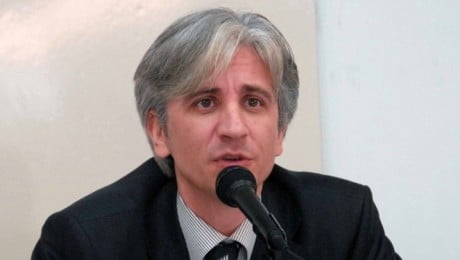Keyword: Hizmet and politics

Mischief-makers and the Hizmet movement
Mischief-makers continue to work hard. Every objective conscience sees that the Hizmet movement now has to struggle for its rights and to defend itself against some unjust and fallacious accusations, such as that the Hizmet movement has created a parallel state, that it is an illegal organization and that it is even a junta.

AK Party Deputy Hakan Şükür resigns due to hostile moves against Hizmet movement
Hakan Şükür, a Turkish member of parliament and former international football player, quit Prime Minister Recep Tayyip Erdoğan’s ruling party on Monday in protest at a government plan to shut down prep schools, revealing underlying intra-party squabbles. İstanbul MP Şükür said he was personally offended by what he called “hostile moves” against the Hizmet movement led by Turkish Islamic scholar Fethullah Gülen.

Turkish Education Ministry engaged in profiling of staff, daily claims
The Taraf daily published a number of new documents on Monday that showed the Ministry of Education has profiled its staff based on their ideological and religious backgrounds. The documents, which date back to September 2013, suggest that ministry personnel who voiced criticism of the Justice and Development Party (AK Party) government and who are members of religious or faith-based groups were “noted” in official communiqués.

Welcome to the Republic of Paranoia
Since conflicting with the secularist segments of society in the Gezi Park events, the Justice and Development Party (AKP) government has taken on a paranoid mentality that tends to relate all developments that are against the AKP government with some form of conspiracy against it. As a result of this paranoid outlook, the AKP government has now gotten itself into a conflict with the Gülen movement. It is arguing that the Gülen movement is working in conjunction with foreign forces to harm the government.

More Divisions, More Democracy
Foreign journalists writing about Turkey like to focus on the most fundamental divide in Turkish society: the rift between religious conservatives and secularists. But these days an internal clash is raging among the conservatives themselves. And it could be a boon for Turkish democracy.

Gülen rejects labeling of Hizmet as ‘gang,’ calls it ‘traitorous’
Turkish Islamic scholar Fethullah Gülen has rejected the labeling of the Hizmet movement as a “gang,” saying those who uttered this word committed “traitorous” behavior. The term gang, “örgüt” in Turkish, has become a famous euphemism in Turkey to denote the terrorist Kurdistan Workers’ Party (PKK) and has a negative connotation.

Turkish PM Erdoğan’s way worries and puzzles
Erdoğan’s political calculations for his strategy do not seem to make much sense to many. Why has he chosen to alienate the Hizmet movement now and not after the elections? Why is he even more furious with the remaining independent media than before? Is he doing all this and others to win or is this a heavy gamble, in despair, to lose or win everything?

How does PM Erdoğan hurt the liberal pious of Turkey?
Turkey has been vigorously debating the nature of its democracy and popular Prime Minister Recep Tayyip Erdoğan’s ruling style, which has increasingly authoritarian tendencies, as never before since the Gezi Park protests in May. From my perspective, the Gezi protests, on which everyone was almost forced to take sides, is a grey area since both the government and the protesters made their share of mistakes.

Votes of religious orders and communities [in Turkey]
The three-week debate between Prime Minister Recep Tayyip Erdoğan and Fethullah Gülen had a long past that falls under this category. Although the AK Party is powerful, the Gülen movement is not a piece of cake it can swallow easily. The AK Party is a political party that keeps its members together using the power and interests available to a ruling party. The Gülen movement, on the other hand, is an army of volunteers.

Criticism and risks
For understandable reasons, governments don’t like to be criticized. But all governments tend to make mistakes. Even if governments and administrations do not like to be criticized, criticizing their mistakes is both a right and a responsibility. It is a moral duty. The criteria for this criticism include fairness, constructiveness and the avoidance of libel and defamation. Damaging the prestige of people, groups, organizations or firms is not criticism.

How will prep school controversy influence elections [in Turkey]?
Gülen is a very important opinion leader in Turkey. He is not a politician but the leader of a social movement featuring religious motives. In addition to his followers, conservative people and groups also pay attention to his views and comments. Even those who are opposed to his worldview send their children to the schools set up by his followers because these schools provide very high quality education and training.

GYV Declaration: The AKP and Hizmet on democracy
The Hizmet movement’s Journalists and Writers Foundation (GYV) released a statement on its website on Thursday in which it said it is worried about the profiling of citizens, civic groups and public employees. It demanded that all the legislation that is reminiscent of the old, anti-democratic Turkey must be revised to ensure their full compliance with fundamental rights and freedoms.

Response to aspersion on Hizmet
HÜSEYİN GÜLERCE The Journalists and Writers Foundation (GYV) made an important statement on Thursday. Its press release, issued in connection with the recent tension that threatens to disrupt social consensus, seeks to defuse tension with regards to the rift between the government and the Hizmet movement. “[T]he ways in which legitimate demands are voiced should […]

What is wrong with independent journalism?
Deputy Prime Minister Bülent Arınç called on prosecutors to take legal action on Monday against the Taraf daily and journalist Mehmet Baransu, who revealed a controversial National Security Council (MGK) document last week, signed by the ruling Justice and Development Party (AK Party) in 2004, which detailed a planned crackdown on the Hizmet (Gülen) movement.


















